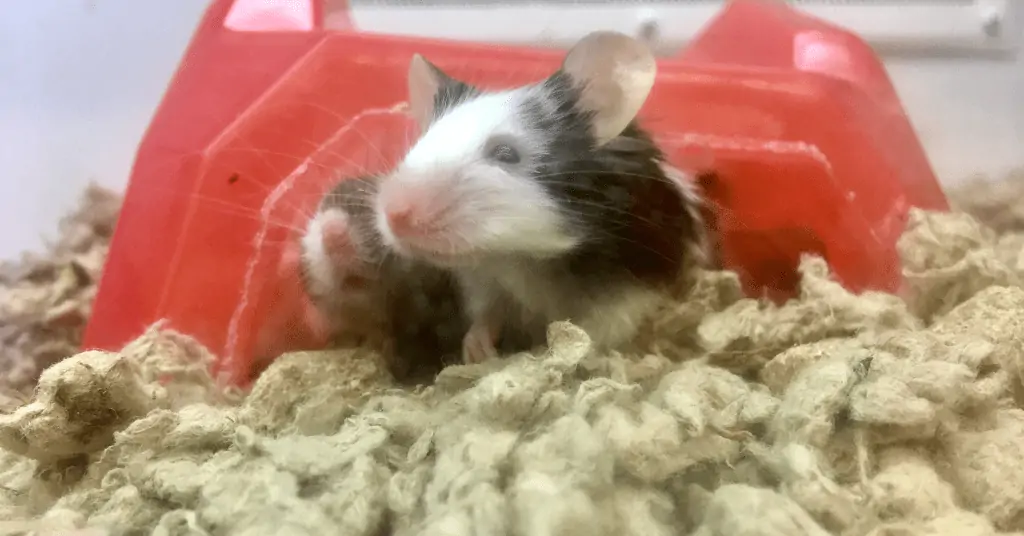Mice, we love to keep them! They’re so cute and small, darting around their cages. But do you find yourself in a situation where your mice keep dying at what seems like a pre-mature age? This article will explain why pet mice keep dying, the signs to look out for, and how to prolong their lifespan considerably!

The petshop is the main cause of most pre-mature mice deaths
Anyone who has purchased a mouse or any animal from a pet shop will know that they don’t have the best reputation for being healthy animals.
This is often due to the fact that they’re bred in terrible conditions and are forced to live in tiny cages with other mice, which can lead to them catching diseases very easily.
Not every shop will have these issues, But, especially the larger ones, Often have bad genetics and lack the special care mice need.
The other issue with pet shops is that they often don’t give the correct information on how to care for your new pet.
They will tell you the basics, but not everything you need to know in order to keep your mouse healthy and happy.
It’s not uncommon for a mouse from a typical pet shop to only have a lifespan of 12 to 18 months down from the expected 5-7 years.
Many of these mice are bred from feeder stock or inbred to produce more mice faster and cheaper for the store.
Inbreeding is one of the main reasons why pet shop mice have such a short lifespan, as it often leads to genetic defects and health problems.
If you have recently bought a mouse from a pet store and it has died soon after, then this is probably the reason why.
The solution is pretty simple, Only buy mice from a reputable breeder who takes good care of their animals.
A good breeder will have healthy, well-cared-for mice that are from strong lines and are less likely to have genetic defects.
They will also be able to give you advice on how to care for your new pet and what to expect in terms of lifespan.
Sometimes, these breeders even go the extra mile and write down everything in a certificate that comes with the mice. These often include genetic linage and health screens that the breeder has done.
When buying from a breeder, you can be sure that you are getting a healthy animal that will have a much longer lifespan than one from a pet shop.
But that’s not the only thing working against your pet mouse’s lifespan…

Using the wrong substrate can be a deadly mistake
There are certain substrates that are ideal and will help to keep your mice healthy, while others can be deadly.
The two main types of substrate that people use are wood chips and paper-based products.
Wood chips, such as cedar or pine, are often used because they’re cheap and easy to find.
They also have the added bonus of being absorbent, which helps to keep the cage clean.
However, These wood chips can also be very dangerous for your mice.
Pine and cedar chips are deadly for mice and other small animals if ingested.
The oils in these woods can cause liver damage, leading to death.
Paper-based products, such as refresh, are a much safer option for your mice than woodchips.
They’re absorbent, which helps to keep the cage clean, and they’re also safe for your mice to eat if they happen to nibble on them.
You should avoid using any kind of sand, gravel, or rocks as a substrate as these can be harmful if ingested.
Nesting and enrichment type beddings also need to be selected with care. Things like Kaytee clean and cozy, Shredded newspaper (or pref none inked paper) and paper towels are all fine.
Undusted hay is also an option but not one of the best ones. Dust is a major factor in the death of mice and can cause everything from respiratory problems to liver damage.
If you must use hay, make sure that it’s dust-free and give your mice plenty of other bedding materials to nest with.

Dirty cages lead to infections
Even the right substrate needs to be subjected to regular cleaning to ensure that your mice are living in a clean and safe environment.
Mice are very prone to respiratory infections, which can often be fatal if left untreated.
A dirty cage is the perfect breeding ground for bacteria and other harmful organisms, so it’s essential that you clean it out regularly.
Infections and respiratory issues are a really large contributor to why pet mice die.
A general rule of thumb is to clean out the cage once a week, but this may need to be increased if your mice are particularly messy.
Spot cleaning should also be done every day to remove any urine or feces that have been missed during the weekly clean.
If you smell ammonia it means the cage hasn’t been cleaned well enough and you’re at risk of your mice getting sick.
This is all compounded if you are using the wrong kind of substrate, such as straw, which is none absorbent and will quickly start to smell.

The food you give your mouse will dictate his overall health
Your mouse’s diet is crucial to his health and wellbeing.
A diet that is lacking in nutrients, vitamins, and minerals will lead to a host of health problems, such as organ damage, anemia, and death.
Too much of the bad things in their diet, like sugar, can also lead to obesity, heart failure, diabetes, and a shorter lifespan.
A diet that is high in fat and protein, on the other hand, can lead to liver problems and a shorter lifespan.
The best way to ensure that your mouse is getting all the nutrients he needs is to buy a good quality mouse food mix from a pet store.
You should also supplement this with fresh fruits and vegetables, as well as small amounts of meat.
Don’t cheap out on bad processed foods stuffed with fillers and chemicals, your mouse’s life depends on you providing him with a healthy diet!
Mice also need fresh water at all times.
Water is just as important for your mouse’s health as food.
Without adequate water, your mouse will quickly become dehydrated, which can lead to organ damage and death.
You should always have a water bottle in your mouse’s cage, and you should check it daily to make sure that it hasn’t run out.

Sometimes mice get sick with no fault to anyone
Mice are tiny delicate creatures and sometimes they get sick without fault to anyone.
They might have a congenital defect that we don’t know about or something might have happened to them before you got them that we can’t control.
The best thing you can do is provide your mouse with the best possible care and hope for the best.
Take him to the vet at the first sign of illness and try to do everything you can to make him comfortable.

And sometimes mice just die
Sometimes no matter what you do and take absolute perfect care of your mouse, he will still die.
Mice are fragile creatures and sometimes they die for no discernable reason at all.
It’s just a fact of life that we have to accept.
The best thing you can do is try your best and be prepared for the worst.
Have a plan in place for what you will do if your mouse dies, such as getting another mouse to keep your other mouse company.
And remember, mice are not disposable creatures! They are living beings that deserve our love and care.
Don’t give up on your furry friend just because he might die, he’s worth the effort!

Signs to look out for that a mouse might be sick or dying
One of the most heartbreaking things that can happen to a pet owner is watching their furry friend become sick or die.
While it’s impossible to prevent all illnesses, there are some signs that you can look out for that may indicate your mouse is sick or dying.
If your mouse is lethargic, has lost its appetite, or is having trouble moving around, these may be signs that something is wrong.
Additionally, if your mouse is wheezing, sneezing, or has discharge from its eyes or nose, these could also be indications of illness.
Eyes might be glazing over white or hearing may seem impaired.
If you notice any of these signs, it’s important to take your mouse to the vet as soon as possible. While not all illnesses can be cured, early diagnosis and treatment can often improve the prognosis for your pet.
Best practices to keep your mouse healthy and long-lived
- Don’t overcrowd the cage
- A clean cage is a happy cage
- Use a large enough cage with plenty of mice-friendly toys
- The right diet is key
- Water is essential
- Take your mouse to the vet at the first sign of illness
- Use proper substrate
- Buy from a reputable breeder
What to do when one pet mouse dies unexpectedly
If a mouse dies unexpectedly but the others haven’t, It’s important to disinfect the cage and all of the equipment.
This will help prevent any potential illnesses from spreading to the other mice.
You should also take the time to figure out what might have caused the death so you can prevent it from happening again in the future.
It’s also a good idea to get another mouse to keep your other mouse(es) company, as mice are social creatures.
If you’re not sure what to do or where to start, there are many resources available online and at your local pet store.
Check out our article on disposing of the dead mouse properly here



